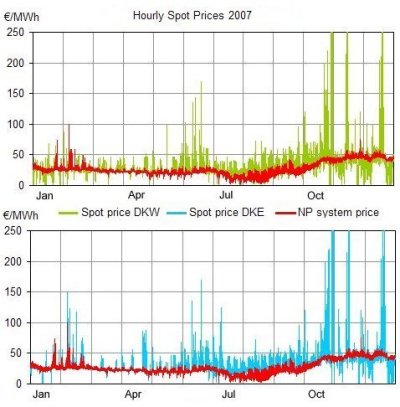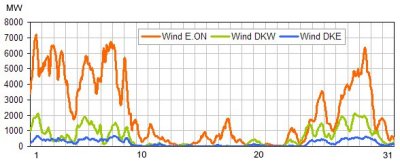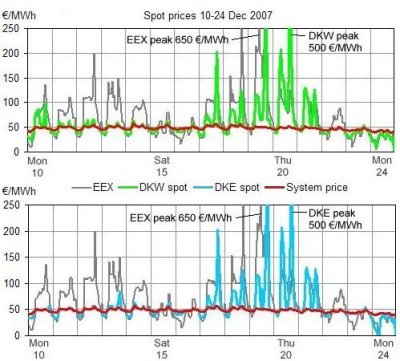
The Effects of Wind Power
on Spot Prices
A Statistical Study for the
Renewable Energy Foundation
by Paul-Frederik Bach
In 2008 Danish wind energy was equal to 19.3% of the electricity consumption in Denmark. In Great Britain it has been assumed that this share of wind energy could easily be replicated.
In order to examine this assumption the Renewable Energy Foundation commissioned an analysis of the impact of wind power on the spot market in Denmark.
Data for the years 2006 to 2008 were downloaded from Energinet.dk and from the German E.ON Netz control area (now Transpower Stromübertragungs GmbH).
The report was published 12th May 2009.
Main Findings
| - | The study examines the performance of the electricity markets concerned and of the interconnected transmission systems. |
| - | The correlation between wind power and spot prices is low because other factors than wind power have significant influence. |
| - | Extreme spot prices indicate strained market conditions and reduced market service. |
| - | Strained conditions result from unfavourable combinations of wind, demand, power plant availability and transfer capability. |
| - | The available capacity of interconnectors is far below nominal capacity. This fact seems to be ignored in most studies on wind power integration. |
| - | German and Danish electricity markets are closely related. Many references have been made to the successful Danish integration of about 20% wind energy. It is more realistic to say that the two countries together have absorbed 7% wind energy. |
| - | Transparency and easy data access is important for analyses of wind power integration. The European TSOs are recommended to develop and publish harmonized market and power system data. |

The dispersion of spot prices is higher for the two Danish price areas (DKW and DKE) than for the Nord Pool system price.
It is natural to assume that the higher dispersions of spot prices in Denmark are caused by the wind power. However, some other factors must be considered.
Temporary capacity reductions on the intercon-nectors are frequently essential factors behind strained conditions. The reasons can be technical (such as cable or transformer faults) or internal bottlenecks within a price area.
Capacity reductions have been observed for all five Danish interconnectors for each of the three years. System operators use temporary capacity reductions to maintain operational security. These reductions are little studied in relation to future large scale integration of wind power.

| - | A two weeks period with very low wind power output in a geographical area including Denmark and the E.ON Netz control area |
| - | High spot prices during some peaks in both Denmark and Germany influence. |
| - | Targeted capacity reductions on the interconnections between Sweden and Denmark contributing to the problems
 |
| 2006 | Demand |
Net exchanges |
Wind generation |
||
| DK | MWh |
Export MWh |
Import MWh |
MWh |
% of demand |
| West | 21,397,717 |
4,771,496 |
269,971 |
4,614,315 |
21.6 |
| East | 14,576,135 |
2,791,770 |
353,869 |
1,489,519 |
10.2 |
| Total | 35,973,852 |
6,103,833 |
17.0 |
||
| 2007 | Demand |
Net exchanges |
Wind generation |
||
| DK | MWh |
Export MWh |
Import MWh |
MWh |
% of demand |
| West | 21,595,508 |
3,130,797 |
1,355,178 |
5,561,711 |
25.8 |
| East | 14,515,894 |
1,185,385 |
2,011,749 |
1,610,371 |
11.1 |
| Total | 36,111,401 |
7,172,083 |
19.9 |
||
| 2008 | Demand |
Net exchanges |
Wind generation |
||
| DK | MWh |
Export MWh |
Import MWh |
MWh |
% of demand |
| West | 21,619,685 |
2,682,452 |
1,655,208 |
5,191,701 |
24.0 |
| East | 14,482,611 |
585,248 |
3,066,726 |
1,785,197 |
12.3 |
| Total | 36,102,296 |
6,976,898 |
19.3 |
||
Wind power installed in Germany and Denmark 2005 and 2008 |
|||
| MW | Germany |
Denmark West |
Denmark East |
| 31 Dec 2005 | 18,428 |
2,393 |
735 |
| 31 Dec 2008 | 25,745 |
2,560 |
766 |
| - | The Effects of Wind Power on Spot Prices, Renewable Energy Foundation, London, March 2009. |
Printed and bound copies of the full-colour, 78 page, study are available from REF (enquiries to admin@ref.org.uk) for £18.00 plus £2.00 postage and packing.

Renewable Energy Foundation is a UK registered charity publishing data and analysis on the renewable and broader energy sector. It is supported by private dona-tions, and has no corporate membership or political affiliation.